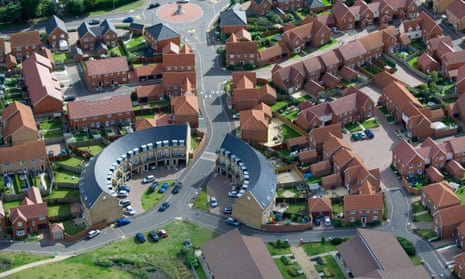Housing built in the UK today and in the next few years may have to be expensively retrofitted with energy-saving technology within the next two decades, according to the government’s climate advisers.
The warning from the Committee on Climate Change came as it launched its five-year review to parliament on Thursday, setting out a new “carbon budget” for the UK that would require an emissions cut of 57% by 2032.
The so-called fifth carbon budget would require substantial new investment in renewable energy and other low-carbon power, and new projects such as carbon capture and storage plants. It would also require substantial investments in home energy efficiency improvements, and measures to help households install their own renewable energy, such as solar panels or heat pumps.
The chancellor, George Osborne, unveiled plans for 400,000 new houses on Wednesday. But if those houses are not built to high standards of insulation and energy efficiency, they could put the UK in breach of its carbon budgets.
Lord Deben, chairman of the Committee on Climate Change, told the Guardian: “We are in danger of building houses that have to be retrofitted, which would be very expensive. We could build them now to low-carbon standards instead.”
The government has scrapped building standards that would have made new houses zero-carbon from next year, without indicating whether new standards would be forthcoming. Ministers also scrapped their flagship insulation scheme, the green deal, again without instituting an alternative, and on Wednesday Osborne cut funding for a separate energy efficiency scheme called ECO.
By the 2030s, according to the committee’s report, about one in seven UK homes would need to be heated with low-carbon energy, and insulation would need to be installed in nearly all UK homes “where it is cost-effective”. Ministers will be advised to accept the targets by the committee, which is the statutory adviser to the government under the Climate Change Act. If they refuse, it could trigger a legal review. No decision is likely until the end of June next year, but the target is likely to be controversial in some sections of the government.
When the fourth carbon budget was published similarly early in the last parliament, Cameron ruled that it would be accepted, but Osborne ordered a review of whether the targets could be met. The fourth budget is now part of government policy.
The committee’s report comes just ahead of a crunch climate change conference in Paris on Sunday , at which heads of state and government will convene in the hopes of forging a new global agreement on greenhouse gas emissions, to take effect from 2020 when current international commitments run out.
The fifth carbon budget marks the halfway point from the first carbon budget period (2008-12) to 2050. The committee said that the UK’s contribution was in keeping with wider international climate action.
This article includes content hosted on d26adhsj11a4c2.cloudfront.net. We ask for your permission before anything is loaded, as the provider may be using cookies and other technologies. To view this content, click 'Allow and continue'.
To date, the UK’s carbon emissions have been cut by more than one-third on 1990 levels and the committee estimates that if current policies are effective emissions will be reduced by an aggregate of 43-46% in 2020. Under the fourth carbon budget, from 2023-27, emissions must fall by 52%. The fifth budget would require emissions reductions of 3% per year from 2014-30, probably rising to 4% per year from 2030-2050. By the 2030s, the report found, the UK would need to be “largely” powered by low-carbon sources of electricity. The government recently reduced the support available to onshore wind and solar power.
A majority of new cars and vans bought in the UK would need to be fully or partially electric, the committee said, compared to a small number today. This would have knock-on benefits in the form of reduced air pollution, which in parts of the UK is significantly in breach of EU air quality standards.
Deben said: “The UK has been at the forefront of global action on climate change. As a nation, we have begun the transition towards a low-carbon economy. By legislating the fifth carbon budget at the recommended level, the government will take the next important step.” Nick Molho, executive director of the Aldersgate group of businesses and other organisations that support a low-carbon economy, said: “Companies investing in low-carbon infrastructure, many of which are international and have a choice as to which countries they want to invest in, are already looking at projects that will be developed in the next decade. Continued confidence in the UK’s low-carbon ambitions is essential to attracting this investment.”
A spokeswoman for the Department of Energy and Climate Change said: “We are determined to meet our climate change commitments in the most cost-effective way, and have already reduced our emissions by 30% since 1990. We are considering the committee’s advice and will set the fifth carbon budget in law by the end of June next year.”
